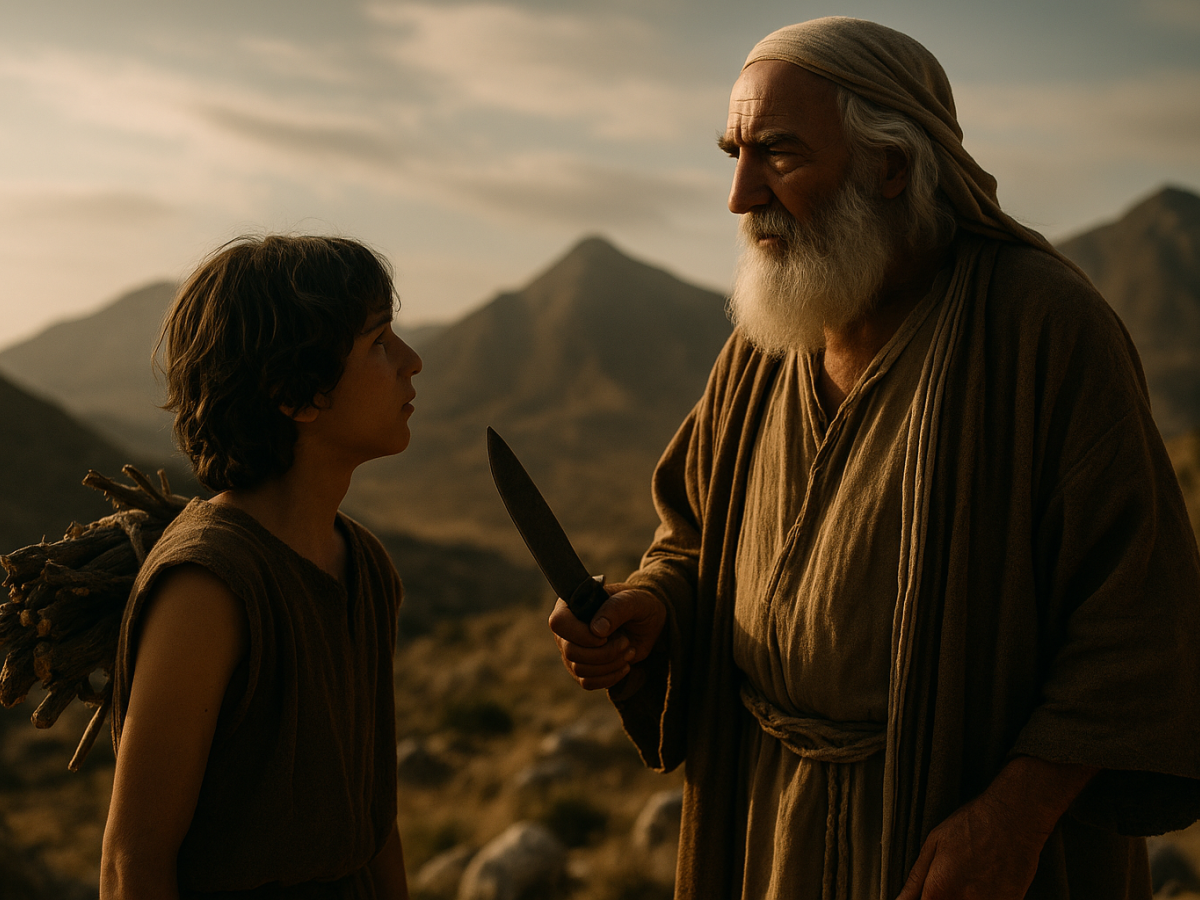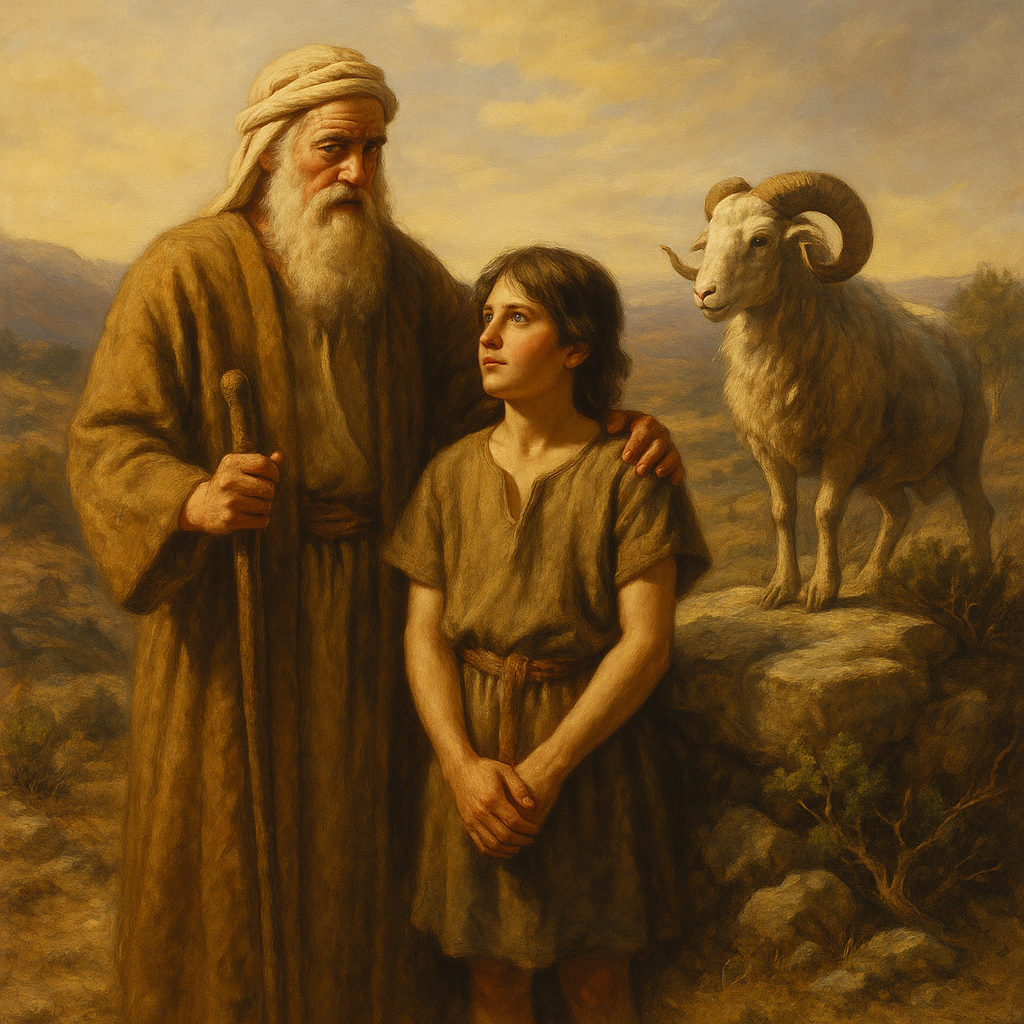
The Binding of Isaac: A Royal Son and the Mountain of Inheritance
The Torah portion, Vayera (And He appeared) contains one of the most puzzling and provocative events in all of Scripture: the binding of Isaac, the Akedah. Few passages generate more debate. One area for further exploration is the language of enthronement.
In The Greatest Exodus, I explore the Divine Warrior’s role as one who ascends mountains, leads processions, proclaims victory, and takes his seat upon the throne to share a covenant meal. The same pattern appears in Genesis 22. The story is more than a test of obedience—it’s a drama of royal succession, covenant inheritance, and divine enthronement woven through the bond between a father and his beloved son.
“Take your son, your only son, whom you love…” and go to the land of Moriah, and offer him there as a burnt offering.”It’s a haunting declaration. With perhaps enthronement overtones.
In Ancient Near Eastern culture—Babylonian, Mesopotamian, and Assyrian alike—this kind of phrasing belonged to the world of kingship. When a ruler spoke of “my beloved son” or “my only son,” he was naming the heir to his throne, the chosen one who would inherit both land and kingdom. The beloved son was the vessel of kingdom continuity.
Kings across Mesopotamia legitimized their rule by introducing themselves as “chosen” or “beloved” of the gods. In royal inscriptions, the title “beloved of the god” carried both affection and authority—it meant divine sanction. David’s own name in Hebrew, Dawid, literally means “beloved.” The word itself echoes this ancient royal idiom.
So, when God tells Abraham to take “your only son, whom you love,” the language strikes the tone of royal inheritance. Isaac is the son of promise, the chosen heir, the one destined to receive and carry the covenantal kingdom forward. But first, he must ascend the mountain.
The Burnt Offering as Royal Food
The command is not only to take the son, but to “offer him as a burnt offering.” In Israel’s worship, the burnt offering (olah) was unique—it was wholly consumed. None of it was eaten by the priests. It was considered, in a sense, Yahweh’s food. In the ANE world, meals often sealed royal covenants or enthronement ceremonies. Here, the “food” of the offering becomes the medium of divine communion.
The mountain of Moriah thus becomes a meeting place between heaven and earth—a cosmic throne room. The ascent is not random. It’s the setting of a royal ritual: a father and son ascending the mountain together, carrying wood and fire, preparing a sacrifice that will confirm divine promise.
Royal Selection and the Beloved Son Isaac
In the ANE imagination, kingship was not just political—it was cosmic. The king was the mediator of divine order, the representative of the gods on earth. When a new king was chosen, he underwent ritual purification, some kind of act of humiliation, anointing, and a symbolic sacrifice or offering to the gods to receive legitimacy.
That background reframes the Akedah. The binding of Isaac is more than a test—it’s an enthronement drama. The son of promise is bound but spared as he emerges as heir of the covenant. This is not so much the story of a father losing his son—but the story of a royal covenant being sealed, and divine purpose being realized.
From Moriah to the Jordan: The Beloved Son Theme Continues
Fast forward to Matthew 3:17. The heavens split open, the Spirit descends like a dove, and a voice declares, “This is my Son, whom I love; with him I am well pleased.” The Greek echoes the Hebrew ratzah—to be delighted, to take pleasure in. The same divine essence that hovers over the waters of creation now rests upon Yeshua as He emerges from the Jordan River.
Here again we see enthronement language. The Son is chosen, affirmed, and anointed. The Ruach descends as at the beginning—hovering like a mother bird—an image of divine nurture and creative power. The pattern repeats: ascent, anointing, declaration. Yeshua stands as the greater Isaac—the beloved Son who will ascend another mountain carrying the wood of His own sacrifice.
The Akedah, the binding of Isaac, prefigures the coronation of the Son who will conquer death, the Divine Warrior whose throne is established through obedience and surrender.
What makes Genesis 22 so extraordinary is how it both resonates with and subverts the ANE royal ideal. In Mesopotamian myths, the beloved son inherits the throne of a god; in Israel’s story, the beloved son, Isaac inherits the covenant of the one true God. The throne is not a seat of empire but a promise of blessing. The test is not one of conquest like ancient kings but one of trust. The Divine Warrior’s victory is not won by slaying rivals but by surrendering the most precious thing—and finding resurrection on the mountain.
Mountain Imagery and the Third Day
The text notes that Abraham “rose early in the morning,” split (bāqahʿ) the wood for the offering, and “on the third day” lifted his eyes and saw the place afar off. That word bāqahʿ—to split or cleave—is used elsewhere for cosmic openings: the heavens splitting, the sea parting, even the veil of the temple tearing at the death of Yeshua. Each signals the opening of the kingdom and the revelation of the divine presence.
And “the third day” is the biblical message for resurrection, new birth, new creation. The son who was as good as dead is raised up, restored, and confirmed as heir. The mountain becomes the site of both sacrifice and enthronement.
From the Ram’s Horn to the King’s Trumpet
Jewish tradition reads the Akedah at Rosh HaShanah—the Day of the Shofar, the awakening blast of Yom Teruah, the coronation of the King. At the story’s climax, a ram appears, caught by its horns in a thicket. Horns, that in later generations, announce enthronement. The sound that once marked substitution now heralds kingship. The ram becomes the emblem of the beloved son redeemed and the king enthroned.
When Abraham “saddled his donkey” to ascend the mountain with his son, Isaac it foreshadowed another royal procession. Centuries later, Solomon, the son of David, descended to the Gihon Spring, was anointed with oil, and then ascended on a donkey to be enthroned at the temple. The pattern repeats: descent to the waters, anointing, ascent to the mountain, enthronement.
The binding of Isaac stands at the root of this sacred rhythm. From Abraham and Isaac to Solomon, from the Jordan to Golgotha, the mountain is always calling the beloved son upward.
So perhaps Genesis 22 is a story that showcases royal commissioning. The beloved son, Isaac tested, affirmed, and enthroned on the mountain of obedience. The covenant meal, the burnt offering, and the ram’s horn all point toward the Divine Warrior who will one day climb His own mountain, bear His own wood, and open heaven itself.


Leave a Reply